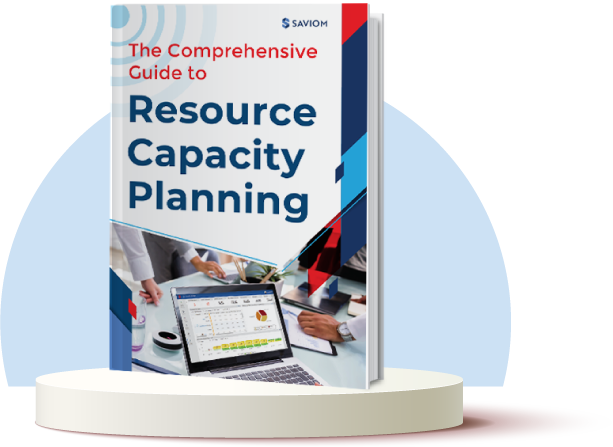The consulting industry has experienced remarkable growth in recent years.
“According to a TRBC report, the global management consulting services market is expected to reach $1.2 trillion by 2028 at a CAGR of 4.9%.”
This surge in demand for consulting services underscores consultants’ pivotal role in driving organizational success. As a result, firms must allocate these resources judiciously to maintain long-term profitability. However, most consultancy firms fall short when it comes to effective resource scheduling. They rely on outdated tools such as spreadsheets or homegrown solutions to identify and assign resources.
These solutions do not provide real-time insights into key metrics and are cumbersome to maintain. As a result, it leads to skill mismatches, which often cause cost escalations, substandard quality of deliverables, and project schedule overruns.
In this blog, we’ll discuss the numerous benefits of resource scheduling for modern consultancy firms.
But before digging deep into it, let’s understand everything about consulting firms and what they do.

Try for Free: Get Futuristic Resource Management Software
What are consultancy firms?
Consulting firms are business entities that offer professional advice, ideas, and solutions to companies undergoing crises that their in-house resources cannot solve. In simple words, when a company requires specialized skills to address an immediate problem, it contacts a relevant consulting firm to provide a quick solution.
These firms play a crucial role in providing strategic direction to businesses across various departments, such as manufacturing, sales, marketing, and human resources. Moreover, consulting firms offer industry-specific personnel or subject-matter experts, known as consultants, to analyze a specific problem at hand and find multiple options to provide a solution.
The following are some of the ways how consultants can help a business:
- Construct business models.
- Assist with problem-solving.
- Provide cost-effective solutions.
- Predict risk and innovate products.
- Strengthen talent management processes.
Types of consultancy firms and what they do
Consulting firms are present in almost every industry. Here are a few examples:
IT consultancy firms
IT consultancy firms play a crucial role in assisting client businesses in the design, implementation, and maintenance of their information technology (IT) systems and infrastructure. These firms aim to provide guidance that simplifies and streamlines various business and technological functions by introducing robust software and solutions.
Audit and Accounting consultancy firms
Audit and accounting consultancy firms help organize and manage a company’s cash flow to avoid issuing money for unfavorable ventures. They also conduct regular audits annually to investigate all financial aspects of a company. Furthermore, these firms advise on tax obligations, the implications of new tax legislation, and tax mitigation strategies.
Engineering consultancy firms
Engineering consultancy firms provide vital engineering services and expertise to companies in need of a specialized skill set. Generally, they have experienced engineers who provide short-term technical advice for a fee. These firms have expertise across many sectors, including civil engineering, rail, telecommunications, energy, automotive, space, and defense.
Read more: What is Engineering Resource Planning?
Construction consultancy firms
Construction firms help companies construct a wide variety of buildings, developments, housing, paths, pavements, roads, motorways, and other types of construction projects. They offer extensive analysis of the environmental factors to ensure that the structure is durable, sustainable, and functional.
Law firms
Law firms are established when a group of seasoned lawyers unites their expertise to practice law collaboratively. These firms serve as trusted advisors to clients, providing expert guidance on legal rights and responsibilities. This includes representing clients in civil or criminal cases, business transactions, and other matters.
Now that we know the different consultancy types and functions, let’s understand how scheduling consultants in these firms differ from other businesses.
How is resource scheduling different for consultancy firms?
Most consultancy projects are of short duration, and clients are billed on an hourly basis. Thus, managers need to keep track of every resource and how they are spending their time. Failure to track their work hours will result in sub-optimal resource utilization and error-prone client billing.
For example, let’s assume a client hired a lawyer for a specific purpose. As per the agreement, the lawyer would work for 3 hours on the project. Now, another client has booked the same lawyer for a much larger project with a demand of 6 hours per day.
So, the lawyer hired for the two projects spends most of their time on the larger project and does not pay attention to the smaller project. This results in poor utilization and client dissatisfaction. Moreover, it leads to revenue losses for the firm.
In this scenario, a proper resource scheduling process enables you to track workforce utilization levels and optimize the consultant schedule as per requirement. It also lets you see all the consultants with clear visibility of their skills, location, availability, cost, and other relevant information for competent resource allocation.
In the following section, let’s understand the benefits of resource scheduling in detail.
Read more: What is Resource Scheduling? How to Schedule Resources for Projects Efficiently?
Benefits of resource scheduling for consultancy firms
Since consultancy companies manage numerous projects and clients simultaneously, efficient scheduling of consultants is vital to ensure successful project delivery. Moreover, strategic resource scheduling enables these firms to foster a culture of productivity and collaboration among their project teams, ultimately enhancing the quality of deliverables and strengthening client relationships.
Here is a rundown of the top advantages of implementing a resource scheduling framework in a consultancy firm:
Ensures skill-based resource allocation for project tasks
Effective resource scheduling practices enable managers to identify and assign skilled consultants to suitable project tasks based on key parameters such as competencies, qualifications, experience, location, availability, interests, and cost rate. Thus, it ensures competent, skill-based allocation of consultants.
Moreover, firms can maintain a real-time competency matrix to record, track, and maintain employees’ skill sets, competencies, and certifications. This skill inventory enables them to deploy ‘best-visible-best-fit’ consultants to projects rather than ‘first-visible-first-fit’ resources and maintain project quality.
Read more: Resource Allocation: A Guide on How to Apply it to Project Management
Minimizes project resource costs significantly
Resource scheduling helps consultancy firms minimize project costs by enabling them to create a cost-effective resource mix for every business opportunity. It also allows them to leverage an on-demand workforce to meet project requirements without compromising resource quality or incurring additional overheads.
Moreover, managers can use the robust reporting analytics of an advanced resource scheduler to keep track of critical project financial indicators like resourcing cost, revenue, and profit margins. Such actionable insights allow managers to identify anomalies and take control of project costs ahead of time, preventing budget overruns.
Maximizes profitable utilization of consultants
Consultancy firms charge their clients on an hourly basis. Thus, billable utilization is a critical KPI to ensure business profitability. A comprehensive resource scheduling process considers resources’ capacity and availability during the task allocation. It allows managers to optimally allocate and utilize consultants across all projects.
Furthermore, managers can forecast and track the utilization of consultants in real time and take corrective actions to maximize billability. For instance, in an IT consultancy firm, the supervisor observes that some consultants spend up to 40% of their time on administrative tasks. So, they bring forth pipeline project schedules and assign these resources to boost profitable utilization.
Optimize resource schedules through leveling and smoothing
A consultancy firm is unlikely to have the necessary resources all the time, especially niche-skilled ones. Here, a robust resource scheduling process can help managers assess consultants’ schedules in real time and make necessary adjustments to cater to dynamic client demands. Accordingly, they can implement appropriate optimization techniques to modify resource schedules and maintain optimal productivity.
For instance, when a project has a fixed deadline, managers can exercise resource smoothing to alleviate overutilization. They can redistribute the workload or pull in additional resources to balance it out. Otherwise, if the project has flexible deadlines, one can leverage the resource leveling technique to move around the start and end dates to match the consultants’ availability. That way, managers can ensure even work distribution and guarantee optimal utilization.
Enables timely delivery of projects
Assigning the right person with the right skills is crucial for a project to finish within the stipulated deadline and budget. So, with the right resource scheduling method, resource managers can foresee the project requirements ahead of time. This provides them with sufficient lead time to ensure the availability of critical resources for project initiation, preventing last-minute firefighting and potential delays.
A proper scheduling process also negates the chances of allocating under or overqualified resources to project tasks, minimizing the risk of sub-par quality of deliverables. In addition, managers can take employees’ interests into consideration when allocating them to projects to improve engagement and maximize the chances of successful delivery.
Read more: 7 Powerful Benefits of Resource Scheduling for Project Managers
Now that we have a better understanding of the benefits of resource scheduling, let’s learn about some best practices that can help consultancy firms optimize their scheduling strategies.
Best practices for effective resource scheduling in consultancy firms
The benefits of resource scheduling are too many to be overlooked by competitive consultancy firms. Therefore, companies should strive to follow and implement the proven best practices mentioned below. Let’s take a look:
Conduct a thorough analysis of current resource management strategies
A modern resource scheduling software has become a necessity for consultancy firms to combat dynamic demand volatility. However, before implementing a solution, firms must assess their current resource management practices to identify existing inefficiencies and gaps in their internal processes. This way, firms can better understand their specific requirements, enabling them to select the most suitable resource scheduling solution.
For example, a consultancy firm may discover that it lacks visibility into resource availability, resulting in frequent double bookings. Therefore, they can adopt a resource scheduler that provides real-time visibility into resource calendars, allowing them to make informed scheduling decisions. It will also enable managers to make changes to resources’ work schedules in real-time to align with the changing project requirements and organizational priorities.
Provide training for quick tool adoption
Comprehensive training and ongoing support for the staff are crucial to ensure the successful adoption of resource scheduling software. It helps familiarize employees with the new system, including how to input data, navigate the interface, and make scheduling decisions based on the system’s capabilities.
Therefore, consultancy firms can conduct workshops and hands-on demonstrations to help employees understand the full functionalities and benefits of the solution. In addition, regular check-ins and feedback sessions can help address any challenges that employees may face while using the tool.
Define roles and standardize processes
Successful implementation of a resource scheduling strategy requires defining roles and processes within the consultancy firm. This involves establishing a clear hierarchy of decision-making authority and assigning specific roles related to resource management processes. Moreover, it also involves standardizing internal procedures such as resource requesting, conflict resolution, schedule changes, etc.
For instance, the consultancy firm can designate a resource manager whose primary responsibility would be to oversee the staff allocation process of a specific department. Besides, they can also clearly define the responsibilities of individual consultants within the same department. This enables the firm to streamline the scheduling procedure, ensure accountability, and prevent internal conflicts.
Regularly monitor and improve resource scheduling strategies
Consultancy firms must foster a culture of continuous learning and improvement to enhance their resource scheduling strategies. For this, they can monitor and track key performance indicators (KPIs) such as resource utilization, project completion rates, client satisfaction, etc.
Moreover, by tracking these metrics, consultancy organizations can gain insights into the effectiveness of their scheduling strategies and identify areas for improvement. Thus, it will enable them to take corrective actions to mitigate bottlenecks, streamline processes, and enhance operational efficiency.
By following these best practices, consultancy firms can maximize the benefits of resource scheduling and achieve efficient resource management.
Conclusion
A well-defined resource scheduling process can enhance the productivity of the consultancy firm’s resources through timely and efficient allocation. It helps maximize billable utilization of the workforce, improve overall profitability, and deliver projects successfully, thereby enhancing client satisfaction.
Are you ready to reap the benefits of resource scheduling?
The Glossary
Read More: Glossary of Resource Workforce Planning, Scheduling and Management
SAVIOM Solution
SAVIOM has over 20 years of experience helping multinational clients manage their resources efficiently and effectively. With over 20 years of experience, this Australian-based MNC has a global presence across 50 countries and has helped 100+ clients meet their specific business goals. Saviom also provides tools for project portfolio management, professional service automation, and workforce planning software. So, SAVIOM can help your business to establish an efficient system geared towards your specific business challenges.










